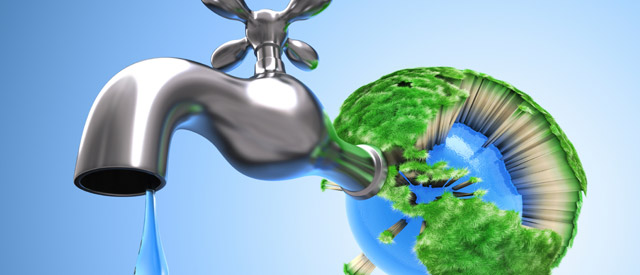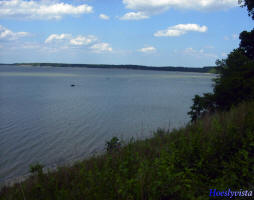 Water Ethics Newsletter, January 2013
Water Ethics Newsletter, January 2013
The latest newsletter from the Water Ethics Network reports on the (lack of) water discussions at December's climate meetings in Doha, and a number of promising applications of ethics perspectives from river basins to water treatment technologies.
This month's newsletter is especially strong on reading material to ensure that the information overload you experienced in 2012 will continue into the New Year! A highlight is the UNESCO-Springer book, "Water, Cultural Diversity and Global Environmental Change: Emerging Trends, Sustainable Futures?" which cost US $120 when released last year, but is now available as a free PDF download.
Here is the link to the Newsletter: http://us1.campaign-archive1.com/?u=31982f6e4937945bfaddf6712&id=658308a0b5&e=1fd5fc01b7
If you would like to sign up for free email delivery service for these monthly e-newsletters, you can do so here: http://waterculture.us1.list-manage1.com/subscribe?u=31982f6e4937945bfaddf6712&id=c96e71399d
The Water Ethics Network Looks ahead to 2013
Our Network is growing and we look forward to an expanded set of activities in 2013. Two new Interns joined the Network as of December, and two Fellows will join from January providing a new dynamism which you will see reflected in the website (waterethics.org) and our social media sites. For details about who we are and what we are planning for 2013, click here. If you are interested in getting involved either personally or through a partnership with your organization, please email us (network@waterculture.org).
Water and Climate: "It's about Adaptation" (and ethics?)
The water message from the COP 18 climate meetings in Doha, Qatar last month emphasized adaptation. The GWP statement by Executive Director Ana Grobicki, and the Water and Climate Coalition's Position Paper underscored the need for adaptive water strategies at all scales. And how does ethics fit into the adaptation picture? This is the topic of the latest blog post by David Groenfeldt in the Water Ethics Network blog.
River Basin Agreements
Mexico and the United States reached an agreement over the Colorado River which will expand wetland habitat in the delta, and treat the river as an integrated basin. For details, click here(from Circle of Blue).
Moldova and Ukraine signed a treat on the sustainable management of the Dniestr/Nistru river basin. The agreement was facilitated by the Environment and Security Initiative (ENVSEC), a joint initiative of the OSCE, the UN Economic Commission for Europe (UNECE) and UNEP. The treaty covers the prevention and control of water pollution, water flow regulation, conservation of biodiversity and protection of the Black Sea environment. For details click here.
Friends of the Earth Middle East have developed AModel Water Agreement between Israel and the Palestinians. Click to download the report by David Brooks and Julie Trottier, March 2012.)
A World Pact for Better Basin Management is being promoted by the International Network of Basin Organizations (INBO). The Pact outlines best practices which the signatories agree to uphold.
Water Ethics in Practice
Alliance for Water Stewardship: The latestnewsletter from the Alliance for Water Stewardship discusses the upcoming release of the "Beta version" of the water stewardship standard and links to recent regional consultations.
Global Thematic Consultation on Water is an open and inclusive space to discuss the role of water in the post-2015 development agenda. This is an opportunity to propose ethics as a discussion topic.
Chemicals in the clothing supply chain. A new Greenpeace report exposes Zara and other major clothing brands for using fabric treated with nonylphenol ethoxylates (NPEs) and carcinogenic amines. Click here for the article in Business Green, or follow this link to the full (14 MB) Greenpeace report, Toxic Threads: The Big Fashion Stitch-Up.
To Read
> The book, "Water, Cultural Diversity and Global Environmental Change: Emerging Trends, Sustainable Futures?", published by UNESCO/Springer, is now available from UNESCO as a FREE ebook (link to detailed book description and download option). Edited by Barbara Johnston and others, this 560-page book provides important examples of water ethics research and action.
> Highlights from the 10-year water policy research program of the International Water Management Institute and the Sir Ratan Tata Trust were presented at the IWMI-TATA Annual Partners' Meet at Anand, India between 28-30 November, 2012. Click for a summary of the meeting. The most ethically interesting of these papers are given below (click to download the PDF):
The National River Linking Project of India: Some Contentious Issues by U. Amarasinghe. India’s National River Linking Project (NRLP), has been on the drawing board for some three decades. Should it be built?
How Do Some Small Farmers Become Prosperous? by A. Kishore, S. Lamba, T. Shah and N.P.Tewari. Control over water (as opposed to mere access to irrigation) and diversified crops with a focus on high-value crops seem to be important factors.
Beyond Digging and Filling Holes by S. Verma and T. Shah. The Mahatma Gandhi National Rural Employment Program (MGNREGA) invests ca. US$ 3 billion annually
in constructing, repairing, renovating rural water structures. This study examines 140 such work projects and draws lessons to improve the program's effectiveness.
Safe Water and Nutritional Improvements by S. Krishnan and R. Indu. This paper brings out the link between nutrition and vulnerability to groundwater contamination.
Andhra Pradesh Farmer Managed Groundwater Systems. by S. Verma, S. Krishnan, A. Reddy, and K.R. Reddy. With the withdrawal of NGOs and their encouragement, the functioning of institutions is declining.
Appraisal of Gender Strategy for PIM in Tamil Nadu, by K. G. Dasthagir. Neither ownership nor membership is sufficient for effective participation by women in water user associations; Surprisingly, landless women agricultural laborers participate more in irrigation governance than do land-owning women.
> Securing Water and Land in the Tana Basin: A Resource Book for Water Managers and Practitioners, published by UNEP, is designed to facilitate implementation of sub-catchment management plans by Water Resource Users Associations (WRUAs) in Kenya. Download the full report (4 MB)
> International Conference on Food Security in Dry Lands, held in Doha 14-15 November 2012, produced some interesting documents touching on important ethical issues:
Opportunities for Food Security, is a policy background paper prepared for the Ministerial Dialogue which then agreed on the Doha Declaration on Food Security in Dry Lands. A few of the more ethics-relevant papers are:
Visions and Action Plans for Optimal Use of Water for Food Security: Investments by Public and Private Sectors in Agricultural Water Management Projects, by
Bart Schultz, UNESCO-IHE, Chair group Land and Water Development, Delft, the Netherlands
A development pathway to optimize sustainability of water investment and minimize social cost, by M. Antonelli, M. Gilmont, and F.Greco. Proposes relying on rainfed as well as irrigation and using the saved water for other uses (urban/industrial, and/or nature).
“Win-Win-Win-Win” Solutions for Dryland Food Security, by Phillip Riddel, explores a potential role for outside commercial investments in agriculture that could be more socially ethical than typical "land grabs".
> Reaching Across the Waters: Facing the Risks of Cooperation in International Waters (5 MB file) by A. Subramanian, B. Brown, and A. Wolf, published by the Water Partnership Program of the World Bank, reviews the experience of cooperation in the Eastern Nile, Ganges, Niger, Syr Darya, and Zambezi.
> Science-Policy Bridges Over Troubled Waters: Making Science Deliver Greater Impacts in Shared Water Systems. A Synthesis Report from the GEF and UNU-INWEH, September 2012. This assessment considers examples from river basins, lakes, groundwater, land-based pollution sources, as well as large marine ecosystems and oceans.
> Framework Document on Water and Climate Change Adaptation has been issued by the Asia-Pacific Water Forum in collaboration with ADB, the World Bank and JICA. [Editor's note: The recommendations emphasize the need for better information, governance mechanisms, and financing, but unfortunately do not mention attitudes, values, or ethics as a dimension of climate change adaptation.]
> Global Water Report 2012 from the Carbon Disclosure Project shows that businesses are well aware of increased water risk but boardrooms are slow to act.
> Putting Nature in the Nexus: Investing in Natural Infrastructure to Advance Water-Energy-Food Security, by K.M. Krchnak, D.M. Smith, A.Deutz, a background paper for the Bonn2011 Conference on The Water, Energy and Food Security Nexus.
> Water Challenges and Cooperative Response in the Middle East and North Africa, a report from the Brookings Institute, outlines water governance policy options and obstacles confronting the region by examining three case studies: the Tigris-Euphrates basin, the Nile basin, and a side-by-side consideration of water stewardship in Yemen and Oman.
> Assessing Poverty Reduction Potential through Investments in Agricultural Water Management: a methodology for country level analysis (2.5 MB) from the AgWater Solutions Project synthesizes lessons from a multi-country study in Africa and India.
> Global Water Forum Discussion Paper, "An assessment of the replacement of traditional irrigation systems by private wells in Tamil Nadu, India," by Kei Kajisa suggests that collective irrigation is preferable to private wells for poverty alleviation.
> Using Scenarios to Improve Understanding of Environment and Security Issues, is a recently released report on climate change impacts commissioned by Organization for Security and Co-operation in Europe (OSCE) and the European Environment Agency. Water is a key issue in the report, but it does not speculate how water ethics might be incorporated into scenarios.
Thank-you to our sponsors!
The Water Ethics Newsletter is an initiative of theWater-Culture Institute and is made possible through a generous grant from the Kalliopeia Foundation.
Share your news (and/or views)
Submit news/views to network@waterculture.org by 5 February to be included in the next Newsletter to be issued on 10 February.
| Contact information |
David Groenfeldt Coordinator, Water Ethics Network
(email: network@waterculture.org) |
|---|---|
| News type | Inbrief |
| File link |
http://us1.campaign-archive1.com/?u=31982f6e4937945bfaddf6712&id=658308a0b5&e=1fd5fc01b7 |
| Source of information | Water Ethics Network |
| Keyword(s) | Water Ethics |
| Subject(s) | AGRICULTURE , ANALYSIS AND TESTS , CHARACTERISTICAL PARAMETERS OF WATERS AND SLUDGES , DRINKING WATER , DRINKING WATER AND SANITATION : COMMON PROCESSES OF PURIFICATION AND TREATMENT , ENERGY , FINANCE-ECONOMY , HEALTH - HYGIENE - PATHOGENIC MICROORGANISM , HYDRAULICS - HYDROLOGY , INDUSTRY , INFORMATION - COMPUTER SCIENCES , INFRASTRUCTURES , MEASUREMENTS AND INSTRUMENTATION , METHTODOLOGY - STATISTICS - DECISION AID , NATURAL MEDIUM , POLICY-WATER POLICY AND WATER MANAGEMENT , PREVENTION AND NUISANCES POLLUTION , RIGHT , RISKS AND CLIMATOLOGY , SANITATION -STRICT PURIFICATION PROCESSES , SLUDGES , TOOL TERMS , TOURISM - SPORT - HOBBIES , WATER DEMAND , WATER QUALITY |
| Relation | http://waterculture.us1.list-manage1.com/subscribe?u=31982f6e4937945bfaddf6712&id=c96e71399d |
| Geographical coverage | n/a |
| News date | 14/01/2013 |
| Working language(s) | ENGLISH |
 you are not logged in
you are not logged in





